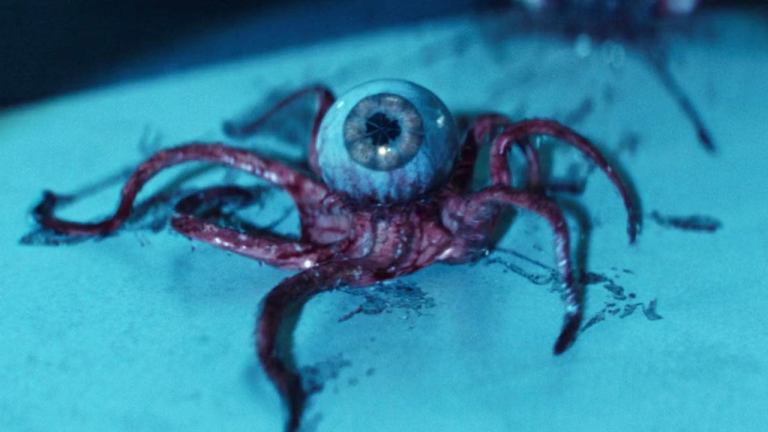
A Strange Inmate At The St. Louis Prison Started Sending Me Letters, I Didn’t Realize Why Until It Was Too Late
He never explained how he got my address or why he chose me to share his story with. But the story was brutal.

Maybe I allowed myself to be disarmed by the fact that he came at three in the afternoon. He knocked very softly for a man of his stature, hulking as he was at six foot four with wide shoulders and big, hairy knuckles. When I asked how I could help him, he reached into his coat pocket, withdrew an envelope, and held it out to me. Who wears a coat in August? I took the envelope and looked it over. Its face was stamped over several times with information for the St. Louis Correctional Facility. A letter from prison. Great. I didn’t know anyone in prison. Then, I noticed a post-it note paper clipped to the back of the envelope. It read simply:
“Please allow the courier to be present to witness the reading of this letter.”
I looked up at the man towering over me on the porch. Though he was large, he didn’t appear threatening. If anything, his calm smile made me think he might be rather friendly. I asked if he had any clue about the contents of the letter or why his presence was necessary for the reading, but the tall man shrugged and gestured towards the foyer. I nodded and invited him in.
In the kitchen, we both sat across from one another at the table. I offered him some coffee, but he silently declined. Glancing up at him one last time, I peeled the flap back and pulled out a ten-page letter, scrawn in hasty handwriting on lined yellow paper. The letter began:
“You don’t know me. You will likely never meet me. I am on death row at the St. Louis Correctional Facility. I was locked up for the murder of my wife and two children. Lionel was 3. Macie was just 6 months old. I loved them dearly. But I did kill them. I will admit that first and foremost. I hate myself for it and I rot in my cell, tortured by the images of their blood dripping off my knuckles. Let me tell you my story.”
I looked back up at the tall man with disgust obvious on my face. His calm, soft grin didn’t waver as he stared back at me. I got up to get a glass of water, then returned to the letter. The author of the letter, whose name I found out was Fitz Willard, had been incarcerated two weeks ago and had began work on his letter as soon as he had access to stationary. He never explained how he got my address or why he chose me to share his story with. But the story was brutal.
Fitz Willard claimed to have been cursed. My first thought was that he suffered from schizophrenia, but he explained that he had been tested for it with no results. He insisted that a demonic spirit was attached to him. The evil spirit taunted him, tortured his every waking moment. It whispered evil deeds in his ear as he lay in bed at night. It appeared in his reflection as he walked past the mirror. The demon was constantly suggesting cruelties and filling Fitz’s brain with insecurities and phobias and sinister ideas. Fitz’s day to day life became riddled by a running commentary on the weakness of humans, the frailty of flesh, and the freedom of bloodletting. Work meetings became haunted by the demon’s screeching. The spirit hissed terrible things about every face Fitz passed on the street.
The worst still, though, was the demon’s thoughts on Fitz’s family. He called Fitz’s wife a whore. Called the children ungrateful bastards. The demon told Fitz that his family didn’t appreciate him, that his wife was cheating on him, that his children couldn’t stand to be around him. That Fitz could never provide enough for them. That their house was a sty. That their clothes were rags. That everything Fitz had worked towards his whole life was a mediocre joke, at best.
For ten pages, Fitz Willard recounted the madness that crept into his psyche. The nightmares that woke him dozens of times a night. The demon made lightbulbs flicker as Fitz walked under them. He made the bath tub run red, like blood. Flies gathered on the mirrors. And the demon’s suggestions became more and more furious. They became demands. Threats, even. Until, one day, Fitz caved in. Caved in the skulls of his two infant children with his bare fists before strangling his wife of eight years so hard that he fractured the vertebrae in her neck before she finally asphyxiated.
That’s how he ended the first letter. The tall man stood and nodded to me in silence, then I led him out the front door. Needless to say, I was shaken. Why would someone decide to share such a terrible story with me?
Day two. The tall man stood on my porch again, at three in the afternoon, and when I answered he handed me the second letter. As off-put as I was by the first letter, I found that as I sat watching television that night, I couldn’t shake the story from my head. I took the second letter and led its deliverer to the kitchen table once again. I wanted more.
What word does justice to the nature of the second letter? Dark. Twisted. Desperate. The yellow paper was rife with drawings of forlorn figures huddled in corners and tiny bodies splayed out in pools of pencil gray. Smudges of graphite made all the little doodles appear in shadows. The second page of the letter was just one big drawing: a woman’s face twisted up in suffering, her mouth hanging open and her throat packed full of maggots. Spiders wrapped up in her hair. Tears whipping down from her eyes. Her hands grasped her own face, jagged nails dug into her cheeks.
That second letter gave a name to the demon–Grimmdeed. Grimmdeed the Tormentor.
I glanced up often from the letter to the man sitting across the table from me. Did he know the terrible tale I was being told? Is that why it was so important that he was present when I read it? His gentle smile never faltered, never faded as he looked idly around my kitchen.
Fitz elaborated on his descent into madness. About the tearful call he made to 911 as he stood over the lifeless bodies of his family. He talked about the trial and how, even in the courtroom, Grimmdeed sat behind him at the defendant’s table and spoke curses about everyone present. Grimmdeed demanded that Fitz try for the bailiff’s gun at the conclusion of the trial, and Fitz did. This lead to a brief beating. Grimmdeed said that Fitz should stand at the door of his cell, screaming profanity and threatening the guards. This lead to a longer beating. Grimmdeed told Fitz to spit at the judge the next day at trial and, as defeated as Fitz’s poor conscience was by the demon’s constant influence, he did.
The letter ended with another drawing. This time of the whole courtroom strewn with slaughtered lawyers and the judge hung above his stand. All of it was in the smeared grey of pencil lead with grimy fingerprints pressed onto yellow paper.
On the third day, I was sitting on the bottom stair just inside the door, waiting for three o’clock. Right on time, the courier arrived and without a word between us I let him walk through the door. He set the third letter on the kitchen table and sat down. His smile was brighter today, wider than usual. I could tell by his demeanor that this must be the final letter.
I peeled the envelope open and sat with a steaming coffee at my elbow. In his third letter, Fitz talked about his days in prison. How even in his incarceration, Grimmdeed the Tormentor haunted him. He described how slow the death penalty process took, how he may die of old age in his prison cell long before an execution date was set. His penmanship became a barely legible scribble. His writing was frantic. He was a rat, trapped in a cage, being prodded constantly by the cruel musings of Grimmdeed the Tormentor. Fitz’s sanity had long past. He doodled himself smearing something on the walls of his cell with his hands. I assume feces. Fitz said he was thinking about ripping his ears off in hopes that he would deafen himself and escape Grimmdeed’s whispers. The yellow pages had stains on them from Fitz’s tears. He apologized for that.
Then, on the last page, a spark of hope. As if he had stopped and gathered himself, his handwriting once again became clean and clear. The last lines read:
“Grimmdeed has grown bored with me. Being locked up like this, I can’t do much evil worthy of him. He told me how to end my curse. Well, no, the curse never ends exactly. This is why I’m writing to you. To pass the curse along to its next victim. But, since I still have a sliver of humanity left in me, I’ll at least let you know how it’s done. You make someone else pick up Grimmdeed’s curse the same way I did: by inviting him into your home three times.”
My heart froze. I didn’t dare to breathe as I looked up from Fitz’s taunting signature at the end of the letter to find the tall man staring into my eyes. His eyes were an endless black. That cruel grin was wider than ever.
“Light the letter on fire” Grimmdeed demanded. ![]()











